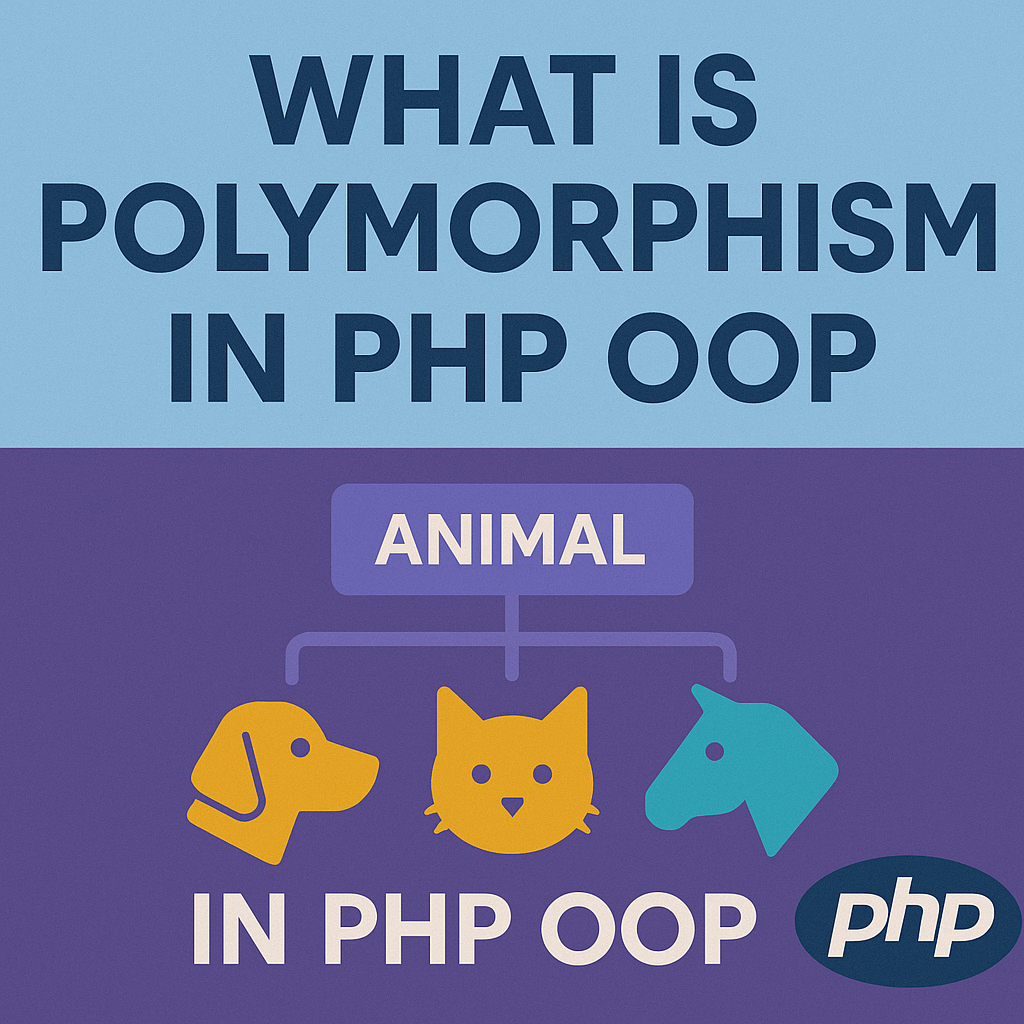Polymorphism is one of the four fundamental principles of Object-Oriented Programming (OOP) in PHP. It allows objects of different classes to be treated as objects of a common super class. This is achieved through method overriding and interfaces.
🔹 What is Polymorphism?
Polymorphism means “many forms.” In PHP OOP, it allows different classes to have methods with the same name but different implementations.
There are two types of Polymorphism:
- Method Overriding (Run-time Polymorphism)
- Method Overloading (PHP does not support function overloading directly like Java or C#)
🔹 1. Polymorphism Using Method Overriding
This is when a child class redefines a method inherited from a parent class.
Example:
<?php
class Animal {
public function makeSound() {
return "Some generic animal sound";
}
}
class Dog extends Animal {
public function makeSound() {
return "Bark";
}
}
class Cat extends Animal {
public function makeSound() {
return "Meow";
}
}
$animals = [new Dog(), new Cat(), new Animal()];
foreach ($animals as $animal) {
echo $animal->makeSound() . PHP_EOL;
}
?>
Output:
Bark
Meow
Some generic animal soundHere, makeSound() is overridden in the Dog and Cat classes.
🔹 2. Polymorphism Using Interfaces
Interfaces allow multiple classes to implement the same method signature in different ways.
Example:
<?php
interface Shape {
public function area();
}
class Circle implements Shape {
private $radius;
public function __construct($radius) {
$this->radius = $radius;
}
public function area() {
return pi() * $this->radius * $this->radius;
}
}
class Rectangle implements Shape {
private $width, $height;
public function __construct($width, $height) {
$this->width = $width;
$this->height = $height;
}
public function area() {
return $this->width * $this->height;
}
}
$shapes = [new Circle(5), new Rectangle(4, 6)];
foreach ($shapes as $shape) {
echo "Area: " . $shape->area() . PHP_EOL;
}
?>
Output:
Area: 78.539816339745
Area: 24
Here, both Circle and Rectangle implement the Shape interface but define area() differently.
🔹 Polymorphism with Abstract Classes
Abstract classes allow method declarations that must be implemented in child classes.
Example:
<?php
abstract class Vehicle {
abstract public function fuelType();
}
class Car extends Vehicle {
public function fuelType() {
return "Petrol or Diesel";
}
}
class ElectricCar extends Vehicle {
public function fuelType() {
return "Electricity";
}
}
$vehicles = [new Car(), new ElectricCar()];
foreach ($vehicles as $vehicle) {
echo $vehicle->fuelType() . PHP_EOL;
}
?>
Output:
Petrol or Diesel
ElectricityHere, Vehicle is an abstract class, and Car and ElectricCar override fuelType().
🔹 Key Takeaways
✅ Polymorphism allows objects of different types to be treated as the same type (e.g., all shapes implement Shape).
✅ Method Overriding enables redefining a method from the parent class in a child class.
✅ Interfaces allow different classes to implement the same method differently.
✅ Abstract classes help enforce method implementation in derived classes.
Would you like me to explain any part in more detail? 🚀

